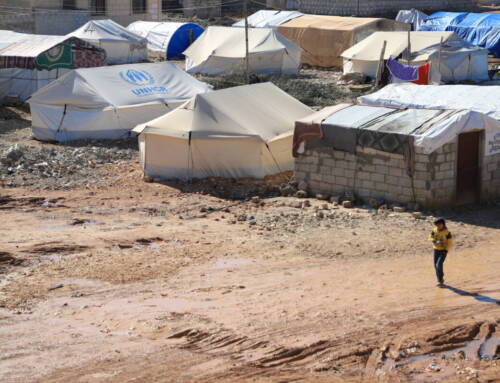IS capture of Bokamel ‘gateway’ between Iraq, Syria
August 11, 2014 The Islamic State (IS) wrested control of […]
11 August 2014
August 11, 2014
The Islamic State (IS) wrested control of al-Bokamel, located in oil-rich Deir e-Zor province along the Iraqi border, from FSA fighters on July 1st. It was the latest in a series of conquests to build a borderless Caliphate between Iraq and Syria – a campaign facilitated by the capture from the Iraqi Army of American-made military equipment.
Since that time, “the area remains calm,” Wisam Al-Arab, an independent media activist in the city of Deir e-Zor tells Syria Direct’s Mohammad al-Haj Ali.
The capture of this small desert outpost represents “the spread of the Islamic State’s power and influence,” Ward al-Haj, spokesman for the Deir e-Zor Mujahideen Local Coordination Committee told Ali in a recent interview. LCC’s are responsible for organizing events on the ground within their communities, as well as documenting battle sites, counting casualties, and engaging in humanitarian efforts (e.g., securing the release of human rights activists).
IS’s rule over al-Bokamel, al-Haj says, “means securing a complete pathway [from Syria to Iraq], not to mention their control over oil fields.”
Q: Which areas does the Islamic State (IS) control in al-Bokamel, and what strategic value do they have?
The IS took control of the city of al-Bokamel in its entirety, and al-Bokamel is considered the gateway between Syria, on the Deir e-Zor side, and Iraq.

Q: What is the significance of the IS’s control over al-Bokamel?
It marks the spread of IS’s power and influence; it means increased implementation of their plan to control the borders and crossings [between Syria and Iraq]. It means securing a complete pathway [from Syria to Iraq]. Not to mention their control over oil fields, which will form an economic base for them.
Q: Why was the IS able to wrest control of al-Bokamel from the FSA?
IS gaining control over al-Bokamel, and other areas, is a result of the military power it enjoys in terms of planning, number [of fighters], and equipment. When the FSA previously managed to gain control over al-Bokamel, the IS was exposed to several attacks from various directions, and was not as powerful as it is today. In short, the reasons for IS’s advance include: the number of mujahideen fighting for them, their religious doctrine surrounding combat, which states that whomever opposes them is an infidel—to say nothing of the booty they acquired.
Q: Which were the brigades and factions participating in the battle for al-Bokamel?
The Mujahideen Shura Council, which includes most of the rural, tribal factions, in cooperation with Jabhat a-Nusra and the Islamic Front.
Q: How many were injured and killed on both sides?
There are no specific numbers, but according to the Mujahideen Shura Council, which was fighting IS, around 50 FSA men died over the course of four days.
Q: The regime has bombed al-Bokamel with warplanes since the IS capture. Why?
My brother, the regime doesn’t adopt specific timing for its bombing, rather the bombardment is continuous. However, perhaps the end of fighting over al-Bokamel, and the fact that the city fell under control of a specific faction, perhaps that caused the bombing, as it was considered a loss by the regime. It was in the regime’s interest for the fighting to continue between different brigades and factions.
Q: How did IS change after the announcement of the Caliphate?
Nothing changed, except the morale in their ranks soared.
For more from Syria Direct, like us on Facebook or follow us on Twitter.






